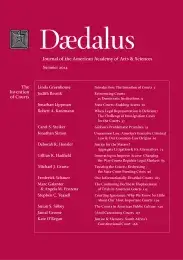When Legal Representation is Deficient: The Challenge of Immigration Cases for the Courts
When the quality of lawyering is inadequate, courts are frustrated in their adjudicative role. Nowhere is this more apparent than in cases involving immigrants hoping to fend off deportation. As an appellate judge on a court whose immigration docket reached 40 percent of our caseload, I have too often seen deficient legal representation of immigrants. Although courts are reactive, resolving cases before them, judges can systematically promote the fair and effective administration of justice. With the aid of some outstanding legal talent, I created the Study Group on Immigrant Representation to help address the immigrant representation crisis. Our work has encompassed a variety of activities, including: publishing symposia; conducting studies documenting the enormity of the problem and proposing solutions; creating initiatives to expand pro bono representation; facilitating the first local government funding of direct immigrant legal services; creating legal orientation programs for immigrants; and developing the Immigrant Justice Corps, an innovative fellowship program. These initiatives represent some steps towards easing the crisis in immigrant legal representation.
A courtroom has multiple players with different roles, but all would agree that adequate legal representation of the parties is essential to the fair and effective administration of justice. Deficient representation frustrates the work of courts and ill serves litigants. All too often, and throughout the country, courts that address immigration matters must contend with such a breakdown in legal representation– a breakdown of crisis proportions.
In brief, the nation’s immigrant representation problem is twofold: 1) there is a profound lack of representation, indicated by the fact that more than 40 percent of non-citizens in deportation proceedings lack representation nationwide; and 2) in far too many deportation cases, the quality of counsel is substandard. Immigrants are easy prey for unscrupulous lawyers, who gouge their clients out of scarce resources and provide shoddy legal services. Apart . . .
